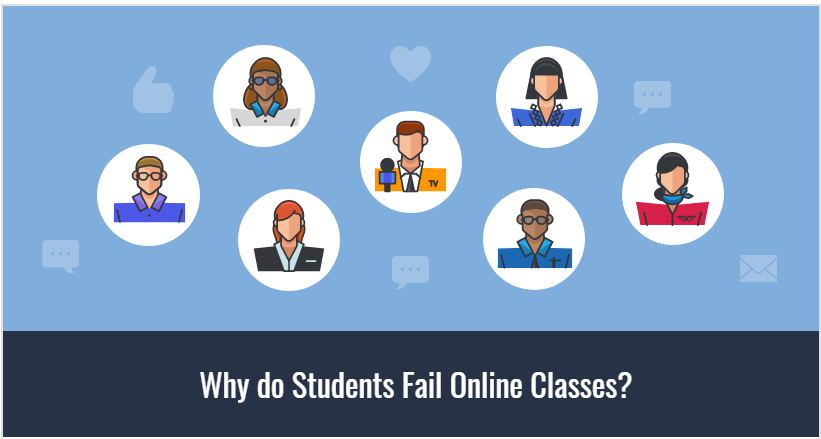Why Do Students Fail Online Classes?
Nowadays, online classes have become a stable fixture in many students’ lives. Online courses are quite advantageous as they allow you to manage your schedule and avoid spending time and money on commuting. Furthermore, anyone can afford online test help which is extremely cheap and convenient. However, despite these benefits, students in the USA are prone to failing online classes much more often than traditional courses. So what lies at the heart of this problem and undermines the effectiveness of online lessons? We have selected a few common reasons that cause this issue and discussed how to avoid them.
Table of Contents
1. Misunderstandings about online classes
Often, students have wrong expectations about the nature of online courses, considering them easier or less demanding than offline classes. However, online lessons require even more discipline. After all, lack of a set schedule doesn’t mean that you will have to work less. Therefore, the best way to succeed in your online classes is to consider them equally important to their offline counterparts, devoting as much time to them as you need to understand each topic you study.
2. Lack of time management skills
You need to devote enough time to each of your online lessons to acquire the necessary skills and knowledge properly. However, online education often lacks a strict curriculum of traditional classes, and it often leads to students failing to evaluate how much time they need to comprehend the learning materials.
To evade this problem, write a custom schedule beforehand, allocating time to each study session to consolidate skills acquired during the lectures. Thoroughly follow your plan to keep your learning in order, and if you need to skip one of the lessons, compensate for it later with additional practice or rewatch the lesson if possible.
3. Loss of motivation for online classes
Similar to the problems of offline studying, complex and confusing topics, exhaustion, and lack of time might quickly wear off the excitement and fun of becoming a college student. The harsh reality is hazardous for your motivation if your plans and goals are impractical from the beginning. For example, if you underestimate the complexity of a subject and the level of effort required to master it.
Thus, evaluate your online classes before taking them, taking into account your affinity to this particular discipline, the task you will have to complete, and potential issues you might encounter. You can even practice writing essays and papers on free topics from scratch or completing assignments similar to those you will find in class. Ask other students for reviews of the subject to understand what you should pay attention to.
4. Equipment issues
Online lessons require a computer or a laptop with a stable internet connection to access lectures, write and submit an essay or assignment and communicate with your professors. However, some students lack these resources or find themselves in a tight spot if their equipment breaks or other technical issues arise. Moreover, having the necessary skills for using a computer and connecting to your lectures is another critical problem.
Consider what you will need during your online lessons and which specialized programs you will be using, and get acquainted with them beforehand. Review alternate solutions for unexpected problems and choose the most appropriate ones.
5. Lack of necessary support
Sometimes online lessons lead to students not knowing where to ask for help and support in case they don’t understand an important concept. This problem is especially relevant for novice learners who might be unfamiliar with how to research the necessary information online.
Often colleges offer additional virtual resources to support students. Try to search for them on the school’s website or ask your professors for additional lessons. You can also ask for help from a more experienced peer who might assist you with a challenging topic or get help from a tutor.
6. Personal issues
Parenthood, work, family and other important occupations take a lot of time, preventing students from being immersed in learning. Hence, they cannot concentrate properly on their studies and become tired and exhausted, complicating their situation.
Try to make your learning more effective instead of spending more time on it. Use outside expert assistance—for example, you can buy a high-quality custom-written paper from expert academic writers from CustomWritings, or a similar service that will easily process your “write my essays online” request in a professional way. Having an example of your task before your eyes is an excellent way to avoid common mistakes, accumulate background knowledge on the subject, become a top-quality writer, and improve your English skills.
7. Feeling of isolation
One of the important characteristics of offline studying is the opportunity for students to interact with each other and their instructors. For people who prefer being in the company of others, adjusting to the isolation of virtual learning environments is quite complicated. This transition might lead to psychological issues that impact their academic performance.
If this issue is relevant for you, consider trying to participate in a study group—even if it happens online, the ability to interact freely with your classmates helps minimize the negative effects of isolation. Don’t forget to communicate with your friends outside the college classroom or search for new people to connect with.
8. Multiple distractions
Concentrating on your studies at home might be harder because of various distractions present: household chores that need to be done, family members trying to engage you in a conversation, and many other factors that prevent you from devoting yourself to your online classes.
Create a comfortable working spot and decorate it appropriately to put you in a mood for learning. Choose a setting that motivates and inspires you, and put a hand-written schedule in a visible place to check it anytime. Turn off notifications on your phone and avoid checking your email and messengers during class.
Conclusion
In fact, online classes can be even more difficult than traditional courses, especially if you haven’t studied remotely before. Struggle with adjusting to this format might lead to a failing grade and low academic performance, especially if your time management skills are lacking. Try to get ready for online courses beforehand to minimize potential disappointment and frustration, and prepare the necessary equipment.
If you don’t understand a particular topic, don’t hesitate to ask for help from your instructors or peers, or even become a customer of professional companies that sell cheap and original assignment examples: this approach is especially helpful to novice writers. Create a quiet and comfortable learning space to avoid distractions and concentrate on your lessons properly, and, of course, don’t forget to take care of your mental health by compensating for the lack of human interaction.
Irwin Michael Reston is an expert who has more than 30 years of experience in optimizing businesses, inspiring individuals and improving human resources departments. He established the BlueLight Consulting Limited to provide learning and training service worldwide.











Lack of self-discipline and time management skills. Taking online classes requires a high level of self-motivation and the ability to manage your time effectively. Some students struggle to keep up with assignments and meet deadlines without the structure of in-person classes.
Difficulty connecting and interacting with teachers and students. The lack of in-person interaction can make it harder for students to reach out for help, ask questions, and form study groups. This can lead to students falling behind.
Distractions at home. Many students find it harder to focus and avoid distractions when studying at home compared to being in a classroom environment. Things like TV, social media, apps on phones, etc. are more tempting.